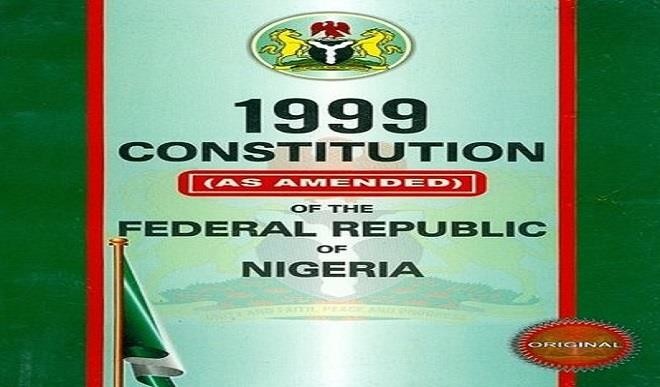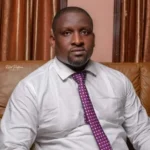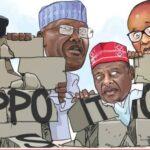In this new information age in which the entire world has truly turned into a ‘global village’, both in terms of time and space, it is indeed little wonder that Nigerians in diaspora are maintaining an ever-increasing interest in events back home in their motherland. It is, no doubt, this keen and up-to the-moment interest in the state of affairs in our dear country, Nigeria, that has informed the decision of the organizers of this occasion, that is, the Foundation for Good Governance and Development in Nigeria, to extend the invitation to me to speak on the subject: ‘Effective Opposition as an Antidote Against Abuse of Power by the Executive in Nigeria’. In accepting this invitation, I feel both humbled and honoured, and I would like here and now to congratulate the foundation on its courage, commitment and concern over events and happenings back home in our dear country.
- The Historical Inevitability of Opposition
It is no exaggeration that without opposition, life and nature would be incomprehensible. This is so because both nature and life itself are organised and structured on the basis of the unity of opposites. For instance, matter is opposed to spirit; male opposed to female; day opposed to night, good opposed to bad, white opposed to black, et cetera.
In the specific case of political systems, both old and new, political opposition has historically taken different forms depending on the different ideological traditions and the socio-economic realities of the society in question. In the slave-owning political and economic systems, the opposition consisted of the chattels themselves and their rebellious leaders. Under feudalism, it was the peasants and emergent merchant class that formed the political opposition. In theocratic political systems, the opposition is made up of adherents of rival interpretations of the ‘holy books.’ Under the capitalist system, the working class organisations and peasant associations constitute the main source of opposition to the system. And under socialism, with its strong tendency towards one-party rule and its adherence to the principles of democratic centralism, opposition emerges within the structure and organs of the party as was demonstrated, for example, by the rift between Stalin and Trotsky in the former Soviet Union. This internal opposition is, of course, distinct from the obvious opposition to the socialist order which is mounted from both within and outside of the system by sympathisers of the capitalist path.
However, in particular reference to the present situation it must be admitted that the idea of institutionalised political opposition is essentially the product of Western liberal democratic thought and practices, introduced to Nigeria and other parts of the so-called ‘Third World’ through the mediation of colonial rule and imperialist penetration and, today, through the all-pervasive influence of globalisation. It is not that the pre-colonial political structures and systems in Nigeria were devoid of institutional opposition to absolutist rule.
And in this tradition, the opposition may be conceptualised as constituting two distinct, but not mutually exclusive, components: namely, the Constitutional opposition, on the one hand, and the Social opposition on the other. The constitutional opposition consists of all those institutions provided for by the constitution to serve as a check on the Executive in the exercise of the enormous powers at its disposal. These institutions would include the Judiciary, the Legislature, the political parties, electoral commissions, et cetera. On the other hand, the political opposition consists largely of civil society organisations such as organised labour, the press, employees’ organisations, religious organisations, student’s associations, and such other interest and lobby groups.
There is yet another perspective in conceptualising the opposition in the context of the traditions of western liberal democracy. This may be done extrapolating the role of the opposition in the two main governmental systems of western liberal democracy, namely; the parliamentary system and the presidential system. Under the parliamentary system, the opposition has a very prominent and clearly defined role. It is made up (say, in Britain) by the largest minority party in the parliament and constitutes ‘Her Majesty’s Loyal Opposition.’ It generally offers critiques of government policies and programmes and presents alternative vistas fully garnished with even a shadow cabinet. Under the presidential system of government, however, the role of the opposition is encapsulated in the dictum or doctrine of the separation of powers.
Opposition and the Nigerian Constitution
Nigeria presently operates a presidential system of government and the Nigerian Constitution is accordingly tailored along the broad principles of the separation of powers as expounded by the founding fathers of the American presidential system. This 1999 Nigerian Constitution has clearly defined the powers of the three tiers of government accordingly.
Section 4(1) – (9) clearly spells out the functions and powers of the Legislature. For instance, Section 4(2) says “The National Assembly shall have powers to make laws for the peace, order and good government of the federation or any part thereof with respect to any matter…”
The power of the Executive, which is vested in the President is clearly stated under Section 5(1) – (5). Section 5(1)(a), for example, says “The executive power of the federation shall be vested in the president and may, subject as aforesaid and to the provisions of any law made by the National Assembly, be exercised by him…”
The powers of the court are stated under Section 6(1) – (6).
This section, especially subsection (1), vests in the courts all the judicial powers of the federation.
It is obvious from the provisions of the constitution quoted above, that the legislature is the most potent arm of government to guard against any act of executive recklessness.
- The weaknesses of Constitutional Opposition
It is quite evident from the foregoing discussion that the authors of the 1999 Nigerian Constitution saw these constitutional provisions of checks and balances as the major guarantee against arbitrary and autocratic abuse of power by the Executive in the Nigerian polity. But every constitution is operated not in an ideal setting but within the context of concrete historical, cultural, economic and social realities, and the specifics of the society in which it is operational. In the case of Nigeria, those very institutions which the 1999 Constitution provided for as checks on executive arbitrariness and a guarantee against the abuse of executive powers and privileges have all but turned out to be weak and ineffective.
This weakness is amply demonstrated by the ineffectiveness of the legislature in Nigeria to check President Obasanjo’s abuses and breaches of the Nigerian Constitution. The weakness of the Nigerian Legislative arm of government in the performance of its constitutional duty of checking executive excesses originated partly from historical factors and also from ideological considerations. Since 1966 when the military first took over the reins of political power from a discredited and disunited political elite, ‘democratic’ civilian rule existed only for a total of four solitary years until the onset of the present democratic experiment in 1999. During this period of more than three decades of military rule, the institution of the legislature was in complete abeyance as the military government combined in itself both executive and legislative powers. The military ruled by decrees and diktats. Thus, the needed experience in legislative work was absent at a time when the powers of the executive were getting more concentrated. So, on the inception of the present ‘democratic’ civilian dispensation, we had an executive arm of government that was overreaching, overbearing and all-embracing on the one hand, and on the other, an emaciated, inexperienced and enervated legislature lacking in both infrastructural support and cognate skills.
This already bad situation has been further compounded by the ideological and class base from which the bulk of the members of the legislative arm were recruited in 1999. Drawn largely from the remnants of feudal, traditional and an elitist middle class that had been bred and weaned by the military in the seventies and the eighties, these legislators were schooled in the arbitrary style of governance of their emirate and military bosses and were generally bereft of virtually all semblance of political credibility and civic responsibility.
Obviously, this kind of a legislature was, and is, hardly in any position to check the constant abuse of executive powers now prevalent in the present Nigerian polity.
To be continue.
Late Balarabe Musa delivered the paper at an international conference organized by the Foundation for Good Governance and Development in Nigeria held in London on June 25, 2005.

 Join Daily Trust WhatsApp Community For Quick Access To News and Happenings Around You.
Join Daily Trust WhatsApp Community For Quick Access To News and Happenings Around You.


